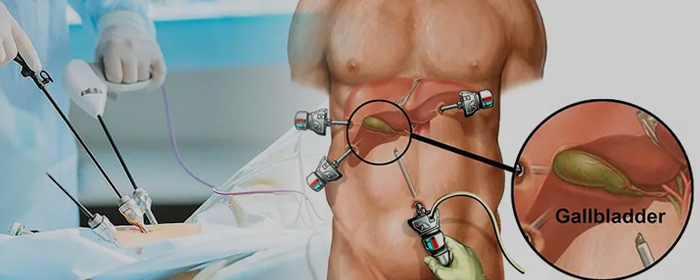Services
Gall Bladder Surgery

Gallbladder removal surgery, also known as a cholecystectomy, is a very common procedure. The gallbladder is a small, pouch-like organ in the upper right part of your tummy. It stores bile, a fluid produced by the liver that helps break down fatty foods. You don't need a gallbladder, so surgery to take it out is often recommended if you develop any problems with it.
Gallbladder removal surgery
There are 2 main ways of removing a gallbladder:
Laparoscopic (keyhole) cholecystectomy several small cuts (incisions) are made in your tummy (abdomen) and fine surgical instruments are used to access and remove your gallbladder
Open cholecystectomy A single larger incision is made in your tummy to access and remove your gallbladder
Keyhole surgery is used most often because you can leave hospital sooner, recover faster and are left with smaller scars than with an open procedure. Both techniques are performed under general anaesthetic, which means you'll be asleep during the operation and won't feel any pain while it's carried out.
Recovery
It doesn't usually take long to recover from keyhole surgery to remove your gallbladder. Most people can leave hospital the same day or the next morning. You'll probably be able to return to most of your normal activities within 2 weeks.
It takes longer to recover from open surgery. You may need to stay in hospital for 3 to 5 days and it could be 6 to 8 weeks before you're feeling back to normal.
Living without a gallbladder
You can lead a perfectly normal life without a gallbladder. Your liver will still make enough bile to digest your food, but instead of being stored in the gallbladder, it drips continuously into your digestive system.
You may have been advised to eat a special diet before surgery, but this doesn't need to be continued afterwards. Instead, you should aim to have a generally healthy, balanced diet.
Some people experience problems such as bloating or diarrhoea after surgery, although this usually improves within a few weeks. If you notice certain foods or drinks trigger these symptoms, you may wish to avoid them in the future.
Risks & Complications
Gallbladder removal surgery is considered to be a safe procedure, but, like any type of surgery, there's a risk of complications. Possible complications include:
Wound infection
Bile leaking into the tummy
Damage to one of the openings (ducts) carrying bile out of the liver
Blood clots